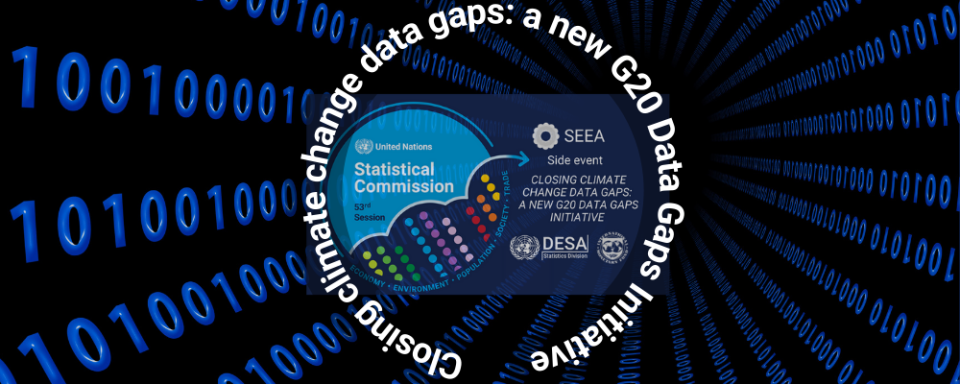Closing Climate Change Data Gaps: a new G20 Data Gaps Initiative

On 23 February, more than 120 participants joined the virtual side event of the 53rd Session of the UN Statistical Commission, “Closing Climate Change Data Gaps: A New G20 Data Gaps Initiative”. The side event, organized by the UN Committee of Experts on Environmental-Economic Accounting (UNCEEA), International Monetary Fund (IMF) and the Statistics Division, focused on the new G20 Data Gap Initiative (DGI).
The new G20 DGI seeks to address data gaps that have been identified as crucial for macroeconomic policy making and micro-financial stability. While the DGI is a G20 initiative, it is expected to have substantial spillover in all regions of the world. Louis Marc Durcharme, Director of the Statistics Division and Chief Statistician and Data Officer of the IMF introduced the new DGI, which will have climate change as a major focus. The Chair of the UNCEEA and Deputy Director-General of Statistics Netherlands, Bert Kroese, explained how the SEEA will provide the methodological basis for filling many of the climate change data gaps, particularly through energy and air emission accounts.
Throughout the side event, speakers and presenters stressed the need for close collaboration between the statistical community and policy makers. The DGI was presented as an opportunity for the statistical community to work hand-in-hand with macroeconomic policy makers to provide policy-relevant and timely data to help countries transition to a low carbon economy. Presentations from Statistics Indonesia and the German Federal Bank and a panel discussion with representatives from Italy, the Netherlands and South Africa all highlighted the SEEA’s important role in filling these data gaps as well as the need for interinstitutional collaboration and frameworks for a successful DGI.
More information, including a recording of the event, can be found on the meeting page.
 Panelists discussing how international statistical standards and frameworks, such as the SEEA, can provide a basis for addressingclimate change data gaps during the \ virtual side event of the 53rd UN Statistical Commission on 23 February 2022. (First Row L-R): Etjih Tsarih (Statistics Indonesia), Gabirel Quiros (IMF) and Antonio Rosolia (Bank of Italy); (Second Row L-R): Melle Bijlsma (Central Bank of the Netherlands), Joe de Beer (Statistics South Africa) and Greg Peterson (Statistics Canada); (Third Row L-R): Bert Kroese (Statistics Netherlands), Robert Kirchner (Central Bank of Germany) and Jean Louis Ducharme (IMF).
Panelists discussing how international statistical standards and frameworks, such as the SEEA, can provide a basis for addressingclimate change data gaps during the \ virtual side event of the 53rd UN Statistical Commission on 23 February 2022. (First Row L-R): Etjih Tsarih (Statistics Indonesia), Gabirel Quiros (IMF) and Antonio Rosolia (Bank of Italy); (Second Row L-R): Melle Bijlsma (Central Bank of the Netherlands), Joe de Beer (Statistics South Africa) and Greg Peterson (Statistics Canada); (Third Row L-R): Bert Kroese (Statistics Netherlands), Robert Kirchner (Central Bank of Germany) and Jean Louis Ducharme (IMF).
